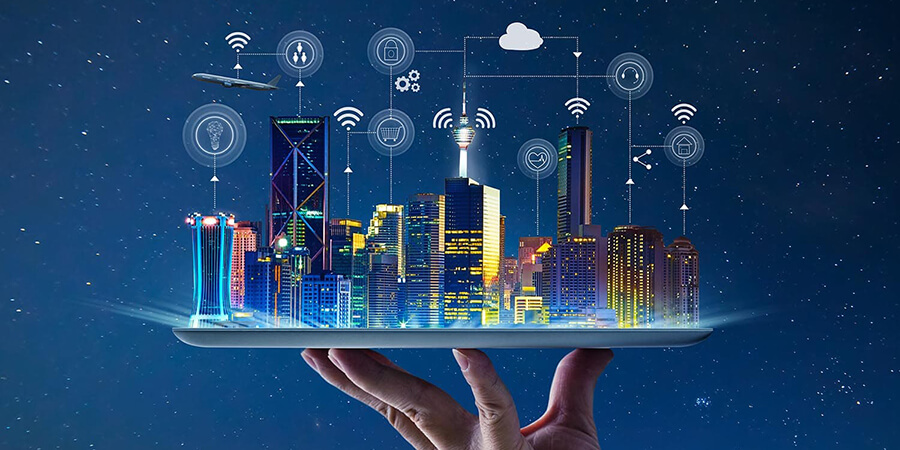Smart cities are a new idea, but they're not a new concept. The idea itself is to make the most of the resources that already exist within the city, and to do so in a way that takes into account the needs and desires of all its citizens. Smart cities are becoming more and more prevalent, with many of the world's metropolises now using some degree of smart technology in their infrastructure. The smarter cities become, the more livable and responsive they will be.
What makes a city smart?
Smart cities use data and digital technology to make better decisions and improve the quality of life. Agencies have access to more comprehensive, real-time data, enabling them to watch events unfold, understand how demand patterns are changing, and respond with faster, lower-cost solutions. Three layers work together to make a smart city rise: as a first step, we need a technology base comprised primarily of smartphones and sensors connected through high-speed networks. The second layer involves specific applications, such as translating raw data into alerts, insight and action. Such requires the right tools, and this is where technology providers and app developers come in. The third and final layer is the usage itself by cities, companies and the public. Many applications succeed only if they are widely adopted, resulting in changed behavior. To this end, people are encouraged to use transit during off-hours, to change routes, to use less energy and water (and to do so during different times of the day) and finally to reduce the strain on healthcare by practicing preventive self-care.
The advantages of smart city planning include fewer traffic jams and safer neighborhoods, as well as an increase in energy efficiency and decreased pollution. Smart city initiatives also help people with disabilities by making buildings more accessible to them. However, there are some disadvantages associated with smart city planning. One is expense: it takes money to install sensors and other devices throughout a city that monitor traffic patterns or air quality, for example. Another disadvantage is that of privacy concerns: if the government is monitoring your movements through the use of cameras or other devices, you may feel like your privacy has been compromised.
An African dream
Examples of smart cities being developed in Africa at the moment include Modderfontein New City in Johannesburg, which is expected to create about 200 000 jobs. Also, Kigali Innovation City in Rwanda's Capital has already implemented smart streetlights, air-quality sensors and Wi-Fi automobiles with cashless payment options. Additionally, there’s the multi-billion-dollar Konza City project in Kenya, which began in 2018 and aims to become Africa's digital hub and a center for technological advancement. This project is envisaged to create 100,000 jobs and around 36,000 homes, and to contribute US$1 billion a year to the East African country’s economy. This ambitious undertaking is expected to be completed by 2050. Despite all the challenges associated with such aspiring development, Africa remains hopeful that smart cities one day will become a reality across the continent.
According to the Smart City Playbook, published by Machina Research and sponsored by Nokia, Cape Town is the smartest city in Africa. South Africa’s second-largest city by population has consistently led the conversation on creative innovations. Currently, the IoT is considered the technical key to a smart city, but there’s no incorporation of IoT in Cape Town's innovative strategies to improve life for its citizens. Cape Town has been praised for contextualizing these improvements according to the needs of the city. Strategies implemented to ensure Cape Town’s high smart score include:
- E-government, which provides better access to more efficient service delivery
- The provision of ICT skills, promoting social and economic development
- Public Wi-fi and improvement to the city’s broadband infrastructure, reducing the digital divide
- The use of CCTV cameras, making the city safer with 560 cameras situated in and around the city
- Cape Town’s open data portal, the first of its kind in Africa
- The use of smart-grid technologies at municipal levels, supporting the digital economy
Technologies used in smart cities
Smart cities can be brought to life through a variety of projects, including smart transportation, healthcare systems, car parking systems and Go Green initiatives, to name a few. All of these systems however utilize several common technologies including sensors, modalities that interact with user hand and body gestures, eye movement scanning, speech recognition, action recognition and many others.
The future is here, and it's looking bright. The challenges are being faced. Improved visualization and data interpretation are the keys to enhancing human interaction with these systems. It is clear that we are living in a new age where technology stands to make most every life easier and better. Things can be done more efficiently, saving money and time, and leading to healthier lives.








